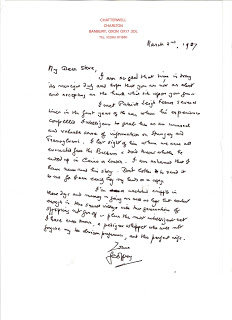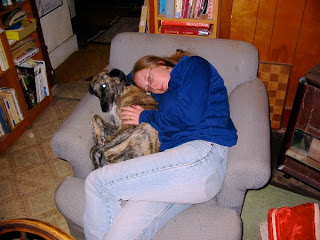Or in her Beacon Hill accent and at her insistence, “Frahn”.
She was a force of nature, a well- born Bostonian who defied convention and became Aldo Leopold’s only female student, a biologist, a hunter, a writer, and a falconer. She and her beloved husband Frederick lived for as many years as I have been alive in a Victorian farmhouse in Wisconsin with few modern comforts, studying prairie chickens. She shot birds with a proper Yankee gun, a 16 gauge Parker, and trained an eagle. She also modeled and traveled to Europe and hunted with the pygmies in Africa and cooked a feral pigeon on Letterman to promote her cookbook (“Stephen, any publicity is good publicity”). After a little initial animosity — is that Wilde?– she became my friend. She NEVER suffered fools.
I recently found this card in my copy of the bird book she translated from the German (see link above) and wondered if she could be referring to Matt’s well- known kestrels; click to enlarge:
I wrote to him:
“Note from Fran Hamerstrom on kestrels at the meet in 91.
“When she finally came in Feb 92 was when I was in Idaho meeting Lib for the 1st time, though I returned in time to drink with her at the Spur. She was 84 I think and on her way to Mexico. Re- tied my peregrine’s knots, edited the ms on my desk, turned my thermostat up to about 80, used her revolver to shoot a stray dog that had been run over by an 18 wheeler to the horrified fascination of my house- watcher Sharon’s kids, & told me I was “well off” because I had good boots & shotguns. I will not dispute.
“Drank Spanish brandy every night with the likes of the Dixon brothers (Wade called her “Miss Frahn”– a fast learner), booted foot on the rail, all 5 feet nothing of her– a long way from Louisburg Square on Beacon Hill where she was born or the mansion on Brush Hill Road in Milton, later my grammar school, where she grew up. But then so am I…”
Matt thought she had hunted with Jennifer Coulson and sent it on. He was right:
“Guilty as charged! Awh, that’s awesome. I actually recognize her handwriting.
After the meet she sent me an autographed, inscribed copy of “Is She Coming Too?”
Wish I still had that. I bought another copy after Katrina, but it’s no replacement.
“That was one of the kestrels that I bred, named Katie. She actually flew back into the car carrying one of the House Sparrows she caught.”
Everyone knows that books are time machines, but notes like this are among my most priceless possessions.










